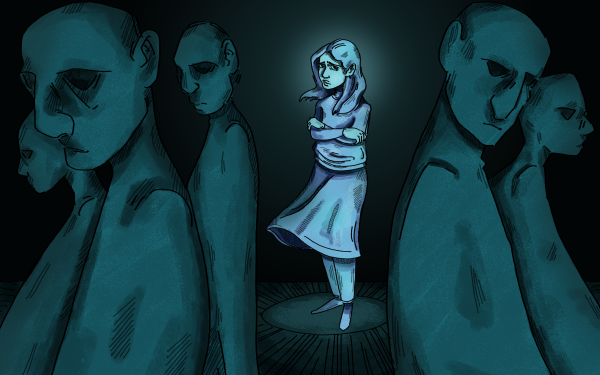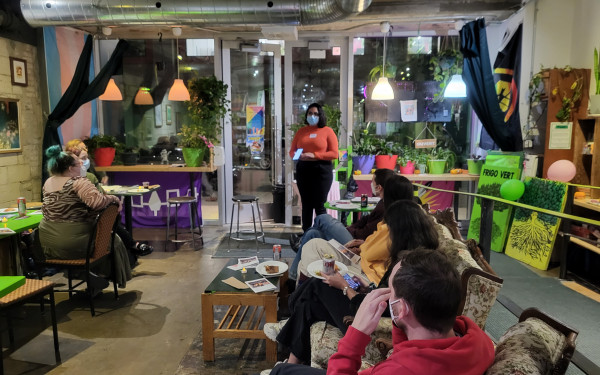Sexual Violence: Unions Accuse Concordia of Violating Accreditation Act
CSU, GSA, and TRAC Denounce Potentially Illegal Appointments
“Please wait, the meeting host will let you in soon,” read Julianna Smith’s computer screen for nearly half an hour on Jan. 18.
The Concordia Student Union’s external affairs and mobilization coordinator was waiting for Lisa White, chair of Concordia’s Standing Committee on Sexual Misconduct and Sexual Violence, to admit her into the committee’s regularly scheduled meeting.
Smith never made it into the meeting, nor did her fellow CSU members or colleagues at the Graduate Students’ Association and the Teaching and Research Assistants at Concordia union. This is despite White having repeatedly made it clear to the union representatives they were welcome into the session.
For years, student members of the SMSV committee have felt unheard by the administration. In order to make effective change, the CSU, GSA and TRAC began boycotting the committee in October 2022. “We need to have the core belief that survivors matter. It’s not only a question of if something happened, but it’s about valuing someone’s experience,” Smith told The Link.
Following the unions’ collective withdrawal from the SMSV committee on Oct. 5, 2022, the university rushed to patch the hole left by the boycott in order to comply with Quebec’s laws on sexual violence in universities. This meant hand-selecting students without the unions’ oversight. In taking such actions, the CSU claims Concordia violated its rights as a student union.
The SMSV committee was first created in 2018 following students’ denunciation of an allegedly mishandled sexual harassment case in Concordia’s English department. The committee’s purpose is “to coordinate University efforts to prevent and respond to Sexual Violence,” Concordia’s website claims.
Such a committee was not solely created out of the university’s volition, but because it needed to comply with new provincial standards on sexual violence in schools. In 2017, the Liberal government passed the Act to prevent and fight sexual violence in higher education institutions—known as Bill 151.
Chapter 2.7 of Bill 151 states that “the educational institution must establish a standing committee made up of students, officers and personnel members, among others, to develop and review the policy and make sure it is followed.”
The law continues: “The standing committee must, in addition, implement a process to ensure that students, officers, personnel members and their respective associations and unions are consulted during the policy development or review process.”
Typically, the SMSV committee is comprised of 16 members. Twelve of these seats are occupied by university employees and administrators. This leaves students with only four seats split amongst the CSU, GSA and TRAC. Though student representation is required, Bill 151 does not explicitly specify a ratio of students to administrators, which Concordia has used to systematically tip the scales against students.
For Hannah Jamet-Lange, TRAC member and former academic and advocacy coordinator at the CSU, there has never been a good time to be involved in the SMSV committee.
When Jamet-Lange was an executive at the CSU, they sat on the committee. “Even though, as students, we were bringing up issues we saw with the policy, they were put to the side and not addressed,” they said.
According to Jamet-Lange, very little voting actually took place in the committee. Because SMSV is an advisory committee and not directly a policy-making one, any student input is marginal at best, they said.
The abysmal amount of student representatives on the committee was a constant hindrance to the process, Jamet-Lange added. “It’s not an equal balance at all—the numbers were stacked against us despite us acting together as a united front.”
Concordia has a long history of sexual misconduct. Well-documented instances of sexual violence earned Concordia a D- rating from Our Turn, a national action plan that examined 14 Canadian universities’ sexual violence policies, in 2017.
Under Bill 151, higher education institutions must have a fully functioning sexual violence committee made up of staff, faculty, and students. Because one quarter of the committee walked out due to the boycott, the university needed to quickly fill those seats to remain operational.
The committee “has an obligation under Bill 151 to continue its work on sexual violence prevention and response,” White said in a written statement to The Link. “[W]e are ready to welcome the student representatives as members of the Standing Committee with prior knowledge of their participation. In the meantime, the committee will continue its work and has invited students to participate.”
CSU General Coordinator Fawaz Halloum and current Academic and Advocacy Coordinator Asli Isaaq confirmed that Concordia appointed students at-large to fill the seats formerly belonging to the unions.
When Smith first heard SMSV would be having a meeting on Jan. 18, she was excited to state her team’s demands and to reinforce the boycott. When she was denied access, she lost hope. “We were confronted with blank screens. As time passed, it became abundantly clear that the administration does not actually care about the opinions of students,” she said. “They really only want students there to legitimize their committee.”
Upon hearing that the university appointed their own students to the committee, Jamet-Lange was frustrated. “By finding other students who are less knowledgeable, they are making sure they don’t break Bill 151,” they said. “They don’t represent the CSU, they don’t represent the GSA, they don’t represent TRAC. This is not the right approach.”
Concordia’s relationships with its student unions have only worsened due to its actions surrounding the SMSV committee. According to Quebec’s Act respecting the accreditation and financing of students’ associations, commonly referred to as the Accreditation Act, student unions have certain rights.
Section 32 of the Accreditation Act states that “[a]n accredited students’ association or alliance may, alone, appoint students who, under an Act, regulation, by-law, charter or agreement, are called upon to sit or participate as student representatives on various councils, committees or other bodies in the institution.” The Act says appointments of students must come from accredited student unions, standards which the CSU and GSA meet.
“We were confronted with blank screens. As time passed, it became abundantly clear that the administration does not actually care about the opinions of students.” — Julianna Smith
Smith, as well as every CSU executive, believe Concordia violated the Accreditation Act by appointing its own student representatives to the SMSV committee. “Because of the Act, we are supposed to have a final say. By them by-passing us, they’re by-passing our rights,” she said. “They claim they’re doing this because of Bill 151.”
According to Concordia Spokesperson Vannina Maestracci, “these representatives decided to withdraw their participation and reiterated this decision several times since, including this January. We have an obligation under Bill 151 to continue the work of the Standing Committee with student participation.”
When asked about the CSU’s claims surrounding the potential violation of the Accreditation Act, Maestracci did not give a direct response.
Since the boycott began in October, the CSU, GSA and TRAC have formed the Inter-Organizational Table for Feminist Affairs. On Jan. 18, ITFA published a list of demands to accompany the boycott.
The demands were printed and delivered to White’s office, Smith said. The university has not yet responded to the list of demands. ITFA’s letter is divided into three primary categories: student-led solutions, transparency and gender equity.
Most urgent is the demand for a survivor-centric committee that is stand-alone, meaning that sexual violence is not treated like any other academic offence. ITFA also wants Concordia to “recognize a new autonomous, student-and worker-run Standing Committee on Sexualized Abuses of Power that operates as the decision-making rather than advisory body presiding over all sexual violence policies and procedures.”
ITFA had created a petition for those wishing to support the boycott and reinforce the demands.
“We’re offering concrete solutions,” Smith added. “The administration should know that we are coming prepared with a better vision for this university’s sexual violence policy.”
This article originally appeared in Volume 43, Issue 10, published January 24, 2023.







